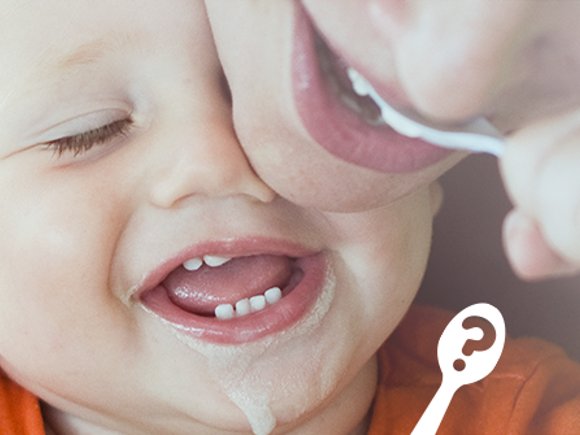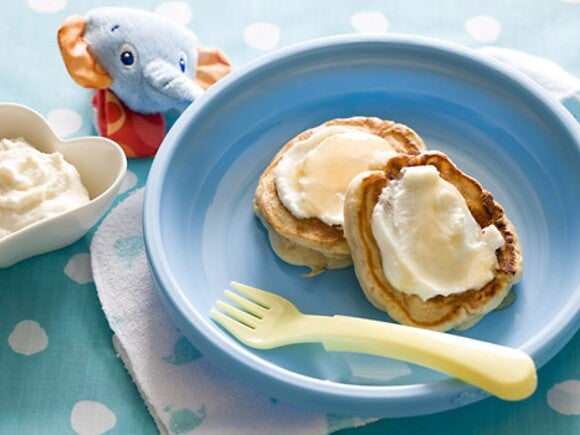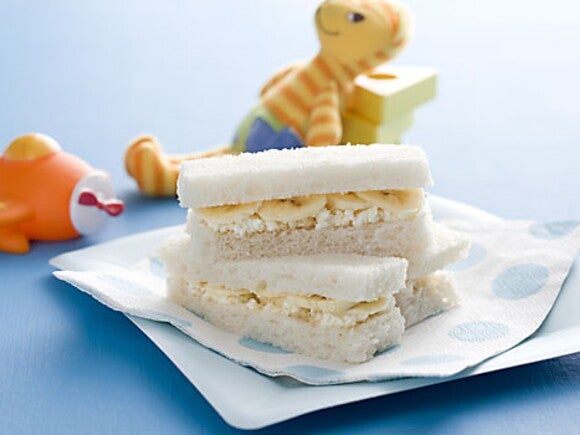An average food schedule for a 12 month old will include foods from each food group every day. Below are suggested servings for each food group.
12 month old feeding guide
1 serve of protein foods per day (1 serve = 65g lean meat, chicken or fish, 2 large eggs, 1 cup of baked beans or lentils).
+
½ serve of fruit per day (1 serve = 150g. A ½ serve is approximately 1 small apple, a kiwi fruit, ½ banana, or ½ cup canned fruit).
+
1-1½ serves dairy per day (1 serve = 250mL milk, 40g hard cheese or 1 x 200g tub yoghurt).
+
Minimum 4 cups of water per day (water needs will vary depending on the weather and your toddler’s level of activity. An indication that they are getting enough fluid is when their urine is fairly clear to very pale-yellow colour).
+
2-3 serves of vegetables per day (one serve is about 75g, or ½ cup cooked vegetables, or 1 cup salad).
+
4 serves of grain (cereal) foods per day (1 serve = 1 slice of bread, ½ cup cooked pasta or rice, or 30g cereal).
+
1 serve of healthy fats (1 serve = 7-10g unsaturated margarine, nut spreads). This may be more if your child is taller or more active than most.
+
7 activity sessions per week, toddlers need at least 3 hours of movement daily spread out over the day. Limit their use of electronic games and television viewing.
+
A good sleep routine – sleep is very important for growth and development.
=
One happy child … fingers crossed!
Limit Discretionary Foods – while it’s ok to have ‘treats’ occasionally as part of a balanced diet, it’s really important to limit these in your child’s daily diet. They can be too high in saturated fat, sugar or salt – none of which is important for your child’s growth and development.
If your child has a diagnosed food allergy, speak to a dietitian or doctor to ensure their dietary intake is adequate.
Planning this week’s menu? Check out our range of toddler friendly recipes.
* The recommended serve sizes are based on toddlers aged 1-2 years as per Australian Guide to Healthy Eating.
Frequently Asked Questions on foods for 1-2 year olds
What are the nutritional needs of a toddler?
Toddlers have specific nutritional needs to support their growth and development. The Australian Guide to Healthy Eating provides details on what makes up a balanced diet for a toddler, and includes a variety of fruits, vegetables, whole grains, lean meat and proteins, and healthy fats. Adequate intake of vitamins, minerals, and fluids is also essential when preparing toddler meals. Consult with your healthcare professional for personalised guidance if your toddler has any specific needs.
What are the dietary requirements for toddlers?
Once your baby becomes a toddler from 1 year of age, they will be starting to consume what the rest of the family are eating at meal times, with less and less modification to meet their developmental needs. The Australian Guide to Healthy Eating provides guidance on what is important in your baby or toddler’s diet at different ages.
What is a good rule to follow for toddlers' nutrition?
The Australian Guide to Healthy Eating provides some practical advice on what to include in toddler meals, from 1 year of age. It’s important to include a variety of foods from all the food groups, including fruits, vegetables, whole grains, lean meat and proteins, and healthy fats. By the time your baby becomes a toddler, at 1 year of age, they will be eating more and more of your normal family foods, with less and less modifications as they get older.
What is balanced nutrition for toddlers?
A good nutritional guide for a balanced diet for toddlers involves providing a variety of foods from different food groups to ensure they receive all the necessary nutrients for growth and development. This means providing them with whole grain cereals, bread, pasta, and rice to provide energy, fibre, and essential nutrients. Offer lean sources of protein such as poultry, fish, eggs, legumes, and tofu. Protein is crucial for muscle development and overall growth. Provide age-appropriate servings of dairy products like milk, cheese, and yoghurt. Include sources of healthy fats like avocados, nut butters, and oils to support growth and development. Limit saturated and trans fats found in processed foods. Minimise sugary drinks, sweets, and processed foods high in added sugars. Avoid excessive salt in meals.
What is the best way to introduce new foods into a toddler's diet?
The best way to introduce new foods for one year olds is through gradual exposure and persistence. It may take up to 8-10 tries before they accept a new food! Offer small portions of new foods alongside familiar favourites. Be a role model by enjoying a variety of foods yourself. Keep mealtimes positive and relaxed, and don't force or pressure your child to eat.
How do I introduce my toddler to healthy eating?
To introduce your toddler to healthy eating, take a gradual and persistent approach. Offer a variety of nutritious toddler foods alongside familiar favourites and choose foods from all the different food groups to ensure nutritional adequacy over time. Be a positive role model by enjoying healthy meals yourself. Make mealtimes enjoyable and relaxed, avoiding pressure or force. Involve your toddler in meal planning and preparation and offer a range of colourful and flavourful options to encourage exploration and acceptance of healthy foods.
How do you encourage toddlers to try new foods?
To avoid fussy eating, encouraging toddlers to try new foods is so important, the more foods they like, the more likely they’ll be getting a nutritious balanced diet. Introducing new foods can be done by:
- Offering a variety of foods repeatedly, as it may take multiple exposures for acceptance.
- Making mealtimes positive and relaxed, avoiding pressure or force.
- Involving your toddler in meal planning and preparation, allowing them to explore and engage with different foods.
- Choose a variety of foods from all the healthy food groups.
Sources:
- Health Direct website. Accessed at https://www.healthdirect.gov.au/healthy-eating-for-children
- Eat for Health – Healthy eating for children brochure. Accessed at https://www.eatforhealth.gov.au/sites/default/files/files/the_guidelines/n55f_children_brochure.pdf






